

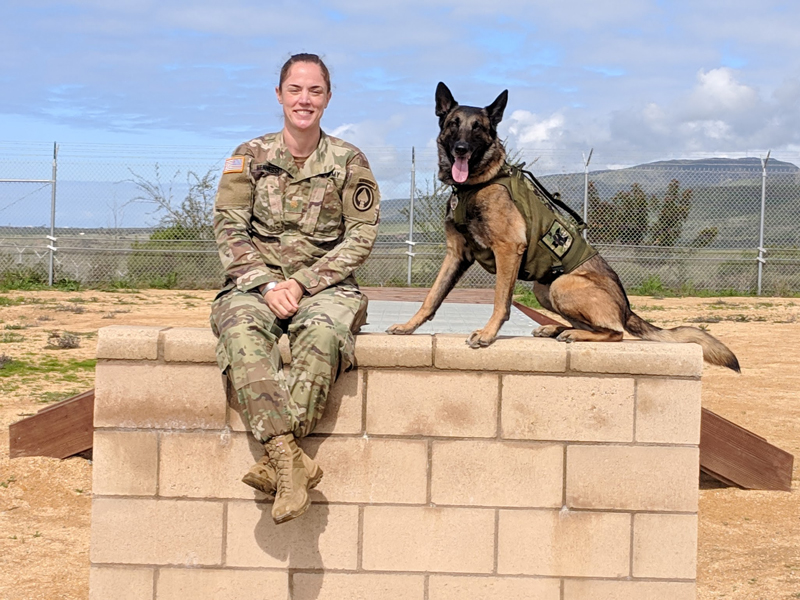
Military vets
Photo courtesy of Maj. Danielle Diamond and Maj. Erin Hennessey November 07, 2019
Blue Hen alumni serve the country in the U.S. Army Veterinary Corps
When you think military, people typically think solider — human soldier, that is. But service animals also play a critical role in serving the United States. Whether the animal is a dog, horse or even a dolphin, the job of treating these animal heroes rests on the shoulders of military veterinarians.
University of Delaware alumni are plentiful in the military ranks and veterinary doctors are no exception. Among those Blue Hens are Capt. Bill Ciancarelli, Maj. Erin Hennessey and Maj. Danielle Diamond, who serve in the U.S. Army Veterinary Corps. One of the six corps of medical specialists that make up the U.S. Army Medical Department, the Veterinary Corps plays a unique role in our nation’s defense strategy. U.S. Army veterinarians perform medical and surgical care, biomedical research and development, and public health duties. All three alumni received veterinary school funding from the Health Professions Scholarship Program, which provides funding for healthcare education in exchange for military service.
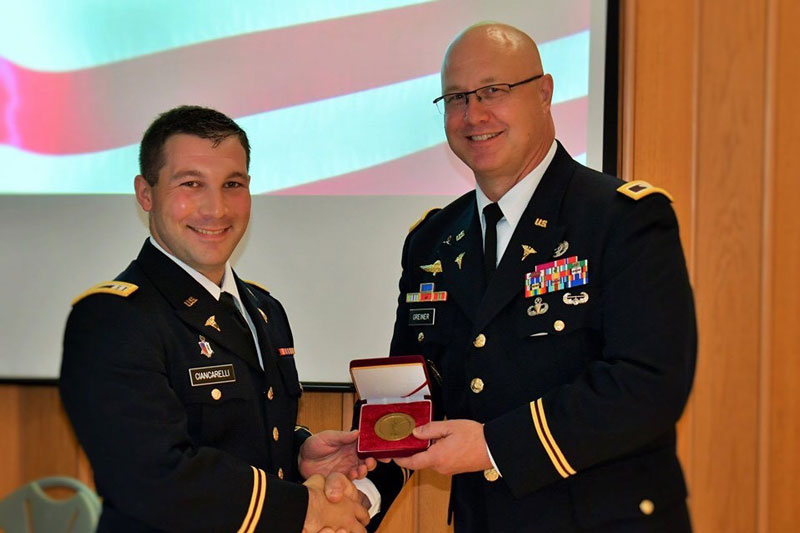
Capt. Bill Ciancarelli
The Class of 2015 alumnus performed three active duty trainings while still in veterinary school. He is currently serving as a first year graduate veterinary education (FYGVE) captain at Fort Belvoir, Virginia.
“There's a lot of things that draw veterinarians to the field, even that can vary based on the day or week we're having,” said Ciancarelli, who is a the former UD Ag Ambassador. “For me, it’s the variability of the kind of care I can provide. One day I may be doing health certificates to Japan, others I may be doing an emergency splenectomy [removal of the spleen.], inspecting working dog kennels, doing site visits to the Pentagon or training K-9 handlers how to provide basic critical care needs to their dogs.”
Like many in the veterinary industry, his days are rarely typical. He performs wellness visits, sick calls, health certificates and surgeries. He’s cared for military working dogs in federal agencies such as the Capitol Police, Secret Service, Department of Homeland Security, Federal Bureau of Investigation and the Pentagon. While on public health duty, he focuses on animal facility inspections, food safety and food defense. He’s also done commercial audits of manufacturers who make or process food consumed by military personnel and their families.
Ciancarelli points to work ethic and teamwork as critical skills to succeed in the military.
“I believe the University of Delaware is the foundation to my work ethic and ability to form support networks that allows me to form very close bonds with complete strangers to achieve a common goal,” said Ciancarelli.
He said that Delaware provided so many options to be a leader and be involved with the community.
“I wish I took advantage of [these opportunities] even more because it provides an individual with the ability to become a more well-rounded human being outside the classroom,” said Ciancarelli. “I also found that the curriculum of the University of Delaware's pre-veterinary medicine major outclasses the rest of the country and its acceptance into veterinary programs is evidence of that. Having capstone courses in dairy, beef, sheep, swine, poultry and equine allowed us hands-on opportunities to understand current issues, public policy and daily life.”
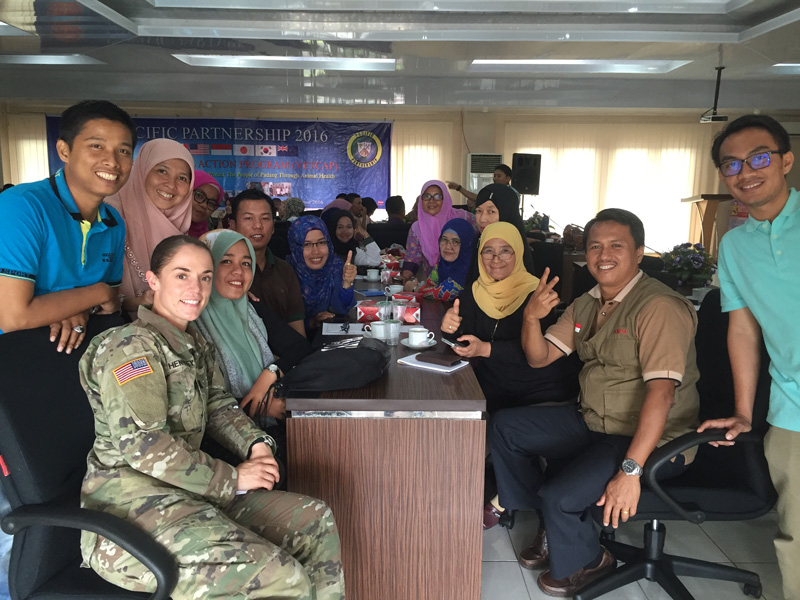
Maj. Erin Hennessey
The Class of 2008 UD alumna has been on active duty with the Army since graduating from the University of Pennsylvania School of Veterinary Medicine in 2012. Hennessey said she originally did not think vet school was in the cards for her.
“My interest for veterinary medicine kept growing as I learned about opportunities in the field outside of traditional clinical practice,” Hennessey said. “The thing that sealed the deal and that keeps me loving my job is the mental challenge of working on a case. It is the reward of seeing a patient improve and, in the case of military working dogs, go back to work.”
Hennessey has taken on several assignments, including the Marine Corps Forces Special Operations Command. She was also deployed with the U.S. Navy as part of a collaborative, global health mission between the U.S. and partner nations in the Pacific. She lived on a ship six months and traveled to Timor-Leste, the Philippines, Vietnam, Malaysia and Indonesia. Hennessey and a group of Americans worked with veterinarians from partner nations to share respective experiences and expertise.
“This was an especially great opportunity to learn about the veterinary response to natural disasters,” said Hennessey. “Unfortunately, veterinarians in that part of the world are well-versed in this topic.”
She is part of a training program for Army healthcare providers called Long Term Health Education and Training, where providers further their education through the pursuit of a clinical residency, graduate programs or other training. She works at Kansas State University's Veterinary Health Center as a radiology resident. She spends her days reading radiographs [X-rays] and other studies in addition to teaching students. When she finishes at Kansas State, she will be one of very few active duty Army veterinary radiologists.
“The military gave me the chance to experience many different facets of veterinary medicine that I would not have been able to do as a civilian veterinarian, including the two facets that were most important to me — global health and working with military working dogs.”
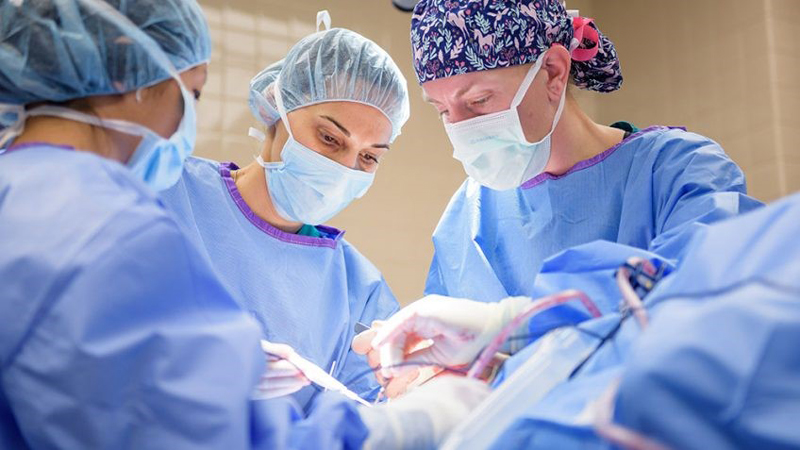
Maj. Danielle Diamond
Class of 2005 graduate Danielle Diamond always knew she was destined to be a veterinarian.
“I've always been ‘that kid’ who was drawn to animals and was obsessed with every new one that I met,” said the Army major, who is in her third year as a small animal surgery resident at N.C. State University College of Veterinary Medicine. “I wasn’t the little girl playing with Barbies; I was playing with Barbie’s horse.”
Diamond comes from a long line of Navy service members — both grandfathers, her father, uncle and cousins have all spent significant time in uniform.
“It is kind of ironic that I went to the green [Army] side, but it’s the only branch that has veterinarians, so my family doesn’t hold too big of a grudge,” Diamond said.
While at the Tufts Cummings School of Veterinary Medicine, Diamond was awarded a two-year scholarship in the Health Professions Scholarship Program in exchange for three years of active duty service.
“My original plan was to serve those three years and then get out and become a large animal ambulatory practitioner,” said Diamond, who majored in animal science. “What can I say; that was more than 10 years ago.”
She served in many roles over that time — as an officer in charge of Veterinary Treatment Facilities at Marine Corps Air Station Cherry Point in North Carolina, RAF Feltwell in England, Area 1 in South Korea and as battalion veterinarian of the 82nd Civil Affairs Battalion at Fort Stewart in Georgia. She was also deployed for a year to Camp Lemonnier in Djibouti as a surgeon cell veterinarian in support of the Combined Joint Task Force in the Horn of Africa.
“Each assignment brought a variety of challenges and unique experiences not to mention thousands of amazing new friends across the world — both Americans and others,” she said.
Her typical day consists of inpatient check-ins and rounds among all of the surgery residents and faculty. Her schedule varies depending on if it's a receiving or a cutting day. During the busiest stretches, she stays at the hospital up to 36 hours at a time.
“On receiving days, I may see anywhere between four and six patients,” Diamond said. “I work with veterinary students and a senior faculty member to develop a game plan for each individual patient. On cutting days, I may have anywhere between four to six surgeries or procedures.”
Then, in true to military life, Diamond is back up the next morning at 0600 to hit the gym in preparation for her biannual Army Physical Fitness Test.
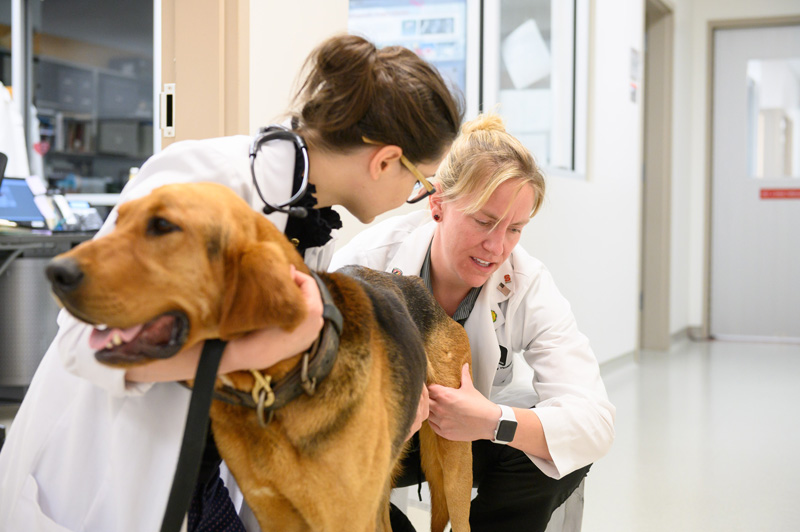
Contact Us
Have a UDaily story idea?
Contact us at ocm@udel.edu
Members of the press
Contact us at 302-831-NEWS or visit the Media Relations website

